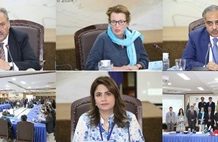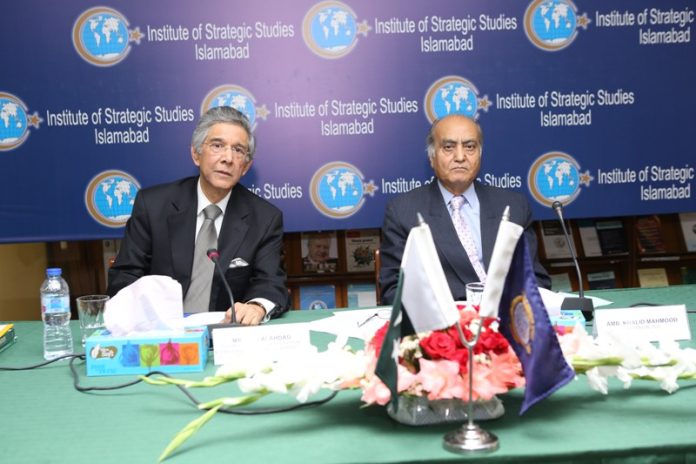Press Release
Public Talk
Resolving Pakistan’s Energy Dilemma: Critical Starting Point and Role of the China Pakistan Economic Corridor (CPEC)
April 18, 2019
“If we believe that in every crisis there is opportunity, Pakistan, with its many crises, should have as many opportunities. If managed correctly, CPEC could help turn Pakistan around. If not, it could become a major liability. There is no middle ground. With the limited options that Pakistan has, this is an opportunity it cannot afford to squander”. This was stated by Mr. Ziad Alahdad, former Director of Operations and Lead Energy Specialist at the World Bank, during his address at a Public Talk on Resolving Pakistan’s Energy Dilemma: Critical Starting Point and Role of CPEC, organized by the Institute of Strategic Studies Islamabad (ISSI), today under its Distinguished Lecture Series. The event was attended by key policy makers, diplomats, representatives of political parties, leaders of industry and civil society, leading academics and the media.
In his address, Mr. Ziad Alahdad, stated that the critical situation in Pakistan’s energy sector continues to be a primary constraint on the country’s economic development. He emphasized that the state of the energy sector (and by extension the economy) is not beyond redemption. He attributed the widening energy deficit to lost opportunities, prohibitive delays, poor implementation, and reform reversals. The CPEC program and particularly its energy components have offered a crucial lifeline to Pakistan. If properly implemented, its potential benefits in terms of its sheer size, its contribution to GDP, foreign direct investment, infrastructure development, are of a magnitude never encountered in Pakistan’s economic history. He maintained that CPEC is not simply about providing funds. It is implicitly calling on Pakistan to catch up on the backlog of reform, improve governance, enhance security and build capacity to mobilize funds on viable terms. CPEC is a well-thought out initiative designed to develop Pakistan rather than increase its dependence on handouts. In effect, China is urging Pakistan to do what is needed for its transition to an economically powerful nation. In serving its own strategic interest of gaining access to the Arabian Sea, China is also investing in CPEC’s success.
He recognized that Pakistan’s policy makers have been successful in articulating the overall objectives for energy policy within a national development context. “The problem is not what the objectives are but how they can be achieved”, Mr. Ziad Alahdad said. He further stated that the absence of coordinated policy formulation is a fundamental issue. He introduced the concept of Integrated Energy Planning and Policy Formulation (IEP) and the institutional structure which supports it. Without this, he maintained, decision-making in the sector remains flawed, and policy initiatives are reduced to shooting in the dark. Rather than offering prescriptive solutions, he advocated building Pakistan’s own capacity to facilitate sound policy decisions. China has always been a proponent of the integrated approach which it used in designing CPEC’s energy interventions. CPEC seeks to nearly double the current power grid. It focuses on indigenous energy sources, designed to reduce dependence and enhance energy security. It introduces solar and wind power at a scale never before envisaged in Pakistan. There is clearly a balance between environmentally benign renewable energy resources (hydro, solar and wind) and a polluting fossil fuel (coal) the reserves of which are too large to ignore. China has extensive world-class expertise in each of these areas from manufacturing, project design, installation through to operation. It is a world leader in research and development in solar and wind technology.
He further stated that the IEP mechanism, tried and tested the world over, is not new to Pakistan where it was introduced in the early 1980s. However, over time, with declining institutions and erosion of human capacity, the effort was abandoned. This was partly because IEP lost favor with international institutions on the presumption that market forces would lead to the right policy choices. This was not valid for the special issues in Pakistan. As a result, what is now in place is an ad-hoc process frozen in the short-term, which responds to crisis situations instead of averting crises through a long-term vision. The CPEC energy program addresses this very concern. Mr Alahdad added that the key element in IEP, perhaps the most difficult and therefore requiring strong political and administrative will, is the restructuring of policy institutions to reverse the unchecked fragmentation that has occurred over the years, in other words to consolidate policy institutions into a single ministry of energy. The recent merger of the Ministry of Power with the Ministry of Petroleum and Natural Resources to form a Ministry of Energy, is a positive first step. But, hydropower has been moved out to a new Ministry of Water Resources. The latter step is a reversal.
He demonstrated how IEP can address the serious issues confronting the sector including the growing deficit, the low utilization of existing resources, developing the optimum energy mix, circular debt, subsidies, and most importantly alleviating the burden of the poor through pro-poor energy policies. In the latter endeavor, who better than China to seek advice from, given its economic miracle of raising over 600 million out of poverty. Mr. Ziad Alahdad emphasized that the skills necessary for re-invigorating IEP are available locally and can be deployed rapidly. Combined with the consolidation of policy institutions, a strengthened policy environment can emerge, capable of addressing Pakistan’s special energy issues. This will help it to emerge from the short-term crisis management mode, paving the way for Pakistan to eventually become a net energy exporter. He further reiterated that with universal recognition of the crisis and the advent of CPEC, the time to act is now.
There was a lively Q&A discussion which focused on how Pakistan should strive for the best and not settle for second best. Participants also discussed how the success or failure of CPEC depends on a few things such as strength of the individual projects, country risks, ability to negotiate and sovereign guarantees.
Earlier, in his welcome remarks, Ambassador Khalid Mahmood, Chairman BOG ISSI, said that Pakistan has gone through one of the worst energy crisis in history – the shortfalls in the energy sector have become an obstacle for the economy of the country. Even though several efforts have been made in this regard such as the induction of new power plants, limited energy resources and limited power structure in the country has meant that Pakistan had to look at other sources of energy. Though projects such as the Iran-Pakistan (IP), Turkmenistan–Afghanistan–Pakistan–India (TAPI) Pipeline and Central Asia-South Asia (CASA-1000) are already being implemented, the launching of the comprehensive CPEC project of which energy is an important component, is a welcome step in order to facilitate industrial production at low cost.












